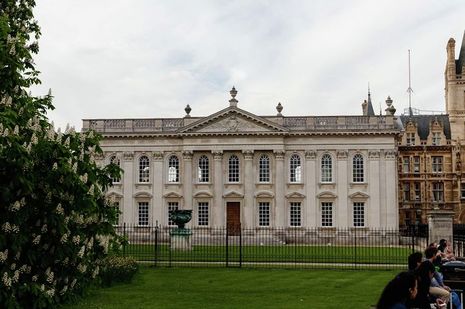Inflated tuition fees are driving an underpublicised access problem for international students
Tom Cleere argues that the high fees international students face are not only extortionate but deter many from applying, creating to a stark access issue based on wealth.

The allure of Cambridge for international students is obvious. A Cambridge degree affords immense privilege and can open doors that a degree from elsewhere cannot is obvious – there is a reason why Cambridge students are often willing to put up with the workload and strange eccentricities of the university. This is even more true for other countries. The university is one of the most prestigious universities in the world, with global university rankings consistently placing Cambridge within the top 10 institutions globally, if not the top 5. Its peers are limited to the elite American universities and, in Europe, Oxford and ETH Zurich. There are very few equivalents elsewhere.
Nevertheless, the high tuition fees international students are subjected to still feel exploitative, with Arts and humanities courses costing around £30,000 a year. Costs quickly rise – a year of Natural Sciences will cost around £40,000. Woe betide medics, who are subject to fees in excess of £60,000 a year. These numbers include tuition fees and college fees, a fee not demanded of domestic students, but exclude living costs and flights. The real cost of studying at Cambridge is therefore even higher. This is not just an undergraduate’s problem - international postgraduates are also subject to higher fees than their domestic counterparts.
"...the vast majority of funding for international students is intended for postgraduates."
It is difficult to offset the cost of these degrees. Obviously, international students are not entitled to student loans and grants offered by the government, and their fees are not subsidised either. However, financial aid from the university is still generally restricted to home or EU students. International students are, for example, not entitled to the Cambridge bursary and the vast majority of funding for international students is intended for postgraduates. To take up a place, an international student must prove that they have the money needed to fund their course. As a result, the high fees and lack of support means that the majority of international students come from wealthy families, or a decently well-off family that has made massive sacrifices in order to support their child’s university education.
International students thus have an under-discussed access issue. Whilst notable strides have been taken to open the university up to British society beyond an upper-class milieu, as evidenced by an increasing proportion of new students coming from state school backgrounds, , far fewer steps have been taken to improve international access. Talented international students are often unable to study at Cambridge – the fees are just too expensive – and money deters many from applying in the first place. In effect, the financial status of international students matters just as much as their academic achievements. This is not to say that the current crop of international students are not worthy of their places but there is a strong possibility that many talented students simply are unable to apply to a university they can never realistically study at because of financial constraints.
As a point of contrast, whilst elite American universities also charge extortionate tuition fees, they often offer far greater financial support to all their students. For example, an international Harvard student will pay less for their degree than an international Cambridge student, while Princeton is famously generous with their funding. For the lower-income prospective international student, there is a far greater incentive to apply to these universities over Cambridge. If there is a competition for the brightest talents, Cambridge will probably lose to their American equivalent. Our loss is their gain.
"Ultimately, the relationship between the university and international students is symbiotic..."
Many would argue these high fees are necessary. The British government, having an obligation to its own citizens, does not subsidise international fees, and Cambridge is forced to charge inflated fees for international students in order to make up for the shortfall in revenue. These fees allow for the university to operate. International students are thus something of a pariah who should be eternally grateful for the privilege to study at Cambridge. There are several counters to these arguments.According to a 2018 report on the impact of international students in the UK, international students provided a net economic contribution of £20.34 billion to the country in 2017 alone. The same report argued that there was no evidence that international students “crowd-out” domestic students, and in fact there was evidence that at a postgraduate level increased numbers of international students led to a higher enrolment of domestic students. International students therefore provide a net benefit both to their universities and the local economy, and we should not fall prey to rhetoric that suggests otherwise.
Furthermore, the idea that Cambridge is reliant on our fees in order to operate is in itself a rather inflated myth: international fees make up a relatively small portion of the university’s revenue. All of Cambridge’s tuition fees only account for around 15% of the university’s total revenue. In the 2018-2019 academic year, tuition fees and education contracts accounted for an income of £320.2 million. Home and EU tuition fees brought in £131.6 million while overseas tuition fees brought in £120.0 million. In comparison, £334.0 million was made by the university’s publishing services while examination services accounted for £478.5 million. The largest revenue stream comes in the form of research grants, which accounted for £592.4 million, and part of this is generated by the international nature of the university – 40% of postgraduates are not British. While the financial contribution of international students is substantial, international fees by no means subsidise the running of the university.
Ultimately, the relationship between the university and international students is symbiotic, and both international students and the university need each other. Rather than discouraging international applicants through high fees, Cambridge should be encouraging further international enrolment in order to remain competitive with other universities. If the university is unwilling to lower international fees, perhaps more financial support can be given to prospective and current international students. Doing so can only strengthen the university’s position.
 News / Eight Cambridge researchers awarded €17m in ERC research grants27 December 2025
News / Eight Cambridge researchers awarded €17m in ERC research grants27 December 2025 News / Downing investigates ‘mysterious’ underground burial vault 29 December 2025
News / Downing investigates ‘mysterious’ underground burial vault 29 December 2025 Lifestyle / Ask Auntie Alice29 December 2025
Lifestyle / Ask Auntie Alice29 December 2025 Sport / Hard work, heartbreak and hope: international gymnast Maddie Marshall’s journey 29 December 2025
Sport / Hard work, heartbreak and hope: international gymnast Maddie Marshall’s journey 29 December 2025 Interviews / Meet Juan Michel, Cambridge’s multilingual musician29 December 2025
Interviews / Meet Juan Michel, Cambridge’s multilingual musician29 December 2025










